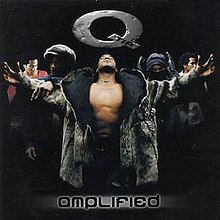
A Tribe Called Quest was an American hip hop group formed in Queens, New York City, in 1985, originally composed of rapper and main producer Q-Tip, rapper Phife Dawg, DJ and co-producer Ali Shaheed Muhammad, and rapper Jarobi White. The group is regarded as a pioneer of alternative hip hop and merging jazz with hip hop, influencing numerous hip hop and R&B musicians.
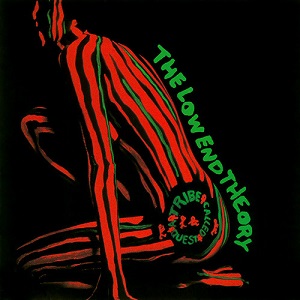
The Low End Theory is the second studio album by American hip hop group A Tribe Called Quest, released on September 24, 1991, by Jive Records. Recording sessions for the album were held mostly at Battery Studios in New York City, from 1990 to 1991. The album was primarily produced by group member Q-Tip, with a minimalist sound that combines bass, drum breaks, and jazz samples, in a departure from the group's debut album, People's Instinctive Travels and the Paths of Rhythm (1990). Lyrically, the album features social commentary, word play, humor, and interplay between Q-Tip and fellow member Phife Dawg.

Life After Death is the second and final studio album by American rapper the Notorious B.I.G., released on March 25, 1997, on Bad Boy Records and Arista Records. A double album, it was released sixteen days after his murder. It features collaborations with guest artists such as 112, Jay-Z, Lil' Kim, Mase, Bone Thugs-n-Harmony, Too $hort, Angela Winbush, D.M.C. of Run-D.M.C., R. Kelly, the Lox, and Puff Daddy. Life After Death exhibits the Notorious B.I.G. further delving into the mafioso rap subgenre. The album is a sequel to his first album, Ready to Die, and picks up where the last song, "Suicidal Thoughts", ends.
The Native Tongues were a collective of late 1980s and early 1990s hip-hop artists known for their positive-minded, good-natured Afrocentric lyrics, and for pioneering the use of eclectic sampling and jazz-influenced beats. Its principal members were the Jungle Brothers, De La Soul, A Tribe Called Quest, Monie Love, and Queen Latifah. The collective was also closely tied to the Universal Zulu Nation. Rolling Stone cites the track "Doin' Our Own Dang" as "the definitive Native Tongues posse cut".
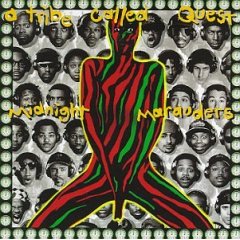
Midnight Marauders is the third studio album by American hip hop group A Tribe Called Quest, released on November 9, 1993, by Jive Records. Recording sessions for the album occurred at Battery Studios, Platinum Island Studios and Scorcerer Sound in New York City. Its production was mainly handled by Q-Tip, with contributions from Skeff Anselm, Large Professor and the group's DJ, Ali Shaheed Muhammad. A culmination of the group's two previous albums, People's Instinctive Travels and the Paths of Rhythm and The Low End Theory, it features an eclectic, gritty sound based on jazz, funk, soul and R&B samples, in addition to socially conscious, positively-minded, and humorous lyrics.
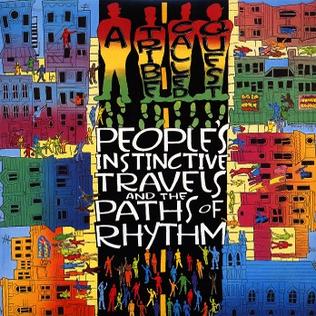
People's Instinctive Travels and the Paths of Rhythm is the debut studio album by American hip hop group A Tribe Called Quest, released on April 10, 1990, on Jive Records. After forming the Native Tongues collective and collaborating on several projects, A Tribe Called Quest began recording sessions for People's Instinctive Travels in late 1989 at Calliope Studios with completion reached in early 1990. The album's laid back production encompassed a diverse range of samples which functioned as a template for the group's unorthodox lyrics.

Kamaal Ibn John Fareed, better known by his stage name Q-Tip, is an American rapper, record producer, singer, and DJ. Nicknamed the Abstract, he is noted for his innovative jazz-influenced style of hip hop production and his philosophical, esoteric and introspective lyrical themes. He embarked on his music career in the late 1980s, as an MC and main producer of the influential alternative hip hop group A Tribe Called Quest. In the mid-1990s, he co-founded the production team The Ummah, followed by the release of his gold-certified solo debut Amplified in 1999. In the following decade, he released the Grammy Award-nominated album The Renaissance (2008) and the experimental album Kamaal the Abstract (2009).

Beats, Rhymes and Life is the fourth studio album by American hip hop group A Tribe Called Quest. Released on July 30, 1996, by Jive Records, it followed three years after the highly regarded and successful Midnight Marauders. Produced by The Ummah, the album is a departure from the joyful, positive vibe of the group's earlier albums and is regarded as their darkest album in content. It debuted at number one on the Billboard 200 and was certified platinum by the Recording Industry Association of America (RIAA) on October 27, 1998.
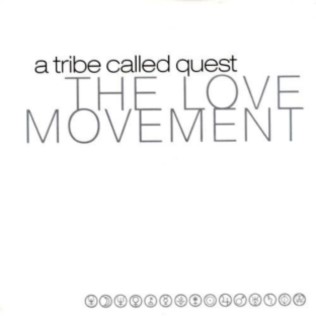
The Love Movement is the fifth studio album by American hip hop group A Tribe Called Quest, and their last album released during group member Phife Dawg's lifetime. Released on September 29, 1998, by Jive Records, it is a concept album, exploring the lyrical theme of love. Musically, it is a continuation of the group's previous album, Beats, Rhymes and Life, featuring minimalist R&B and jazz-oriented production by The Ummah. The lead single, "Find a Way", charted on the Billboard Hot 100 and was followed by a second single, "Like It Like That". The album debuted at number three on the Billboard 200 and was certified gold by the Recording Industry Association of America (RIAA) on November 1, 1998. The group announced its disbandment a month before the album's release.
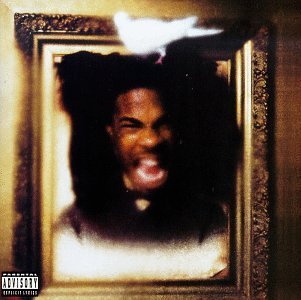
The Coming is the debut studio album by the American rapper and record producer Busta Rhymes. It was released on March 26, 1996, by Flipmode Entertainment and Elektra Records. The album contains contributions by the Def Squad members Redman, Keith Murray, and Jamal; as well as Q-Tip, Zhané, Leaders of the New School, and several Flipmode Squad members. It was produced by DJ Scratch, Easy Mo Bee, and the Ummah, among others. It serves as Rhymes's first solo album after the breakup of Leaders of the New School two years prior, and his first full-length project after numerous guest appearances on other songs with artists such as A Tribe Called Quest, the Notorious B.I.G., Heavy D and the Boyz, and Mary J. Blige.

The Infamous is the second studio album by the American hip hop duo Mobb Deep. It was released on April 25, 1995, by BMG, RCA Records and Loud Records. The album features guest appearances by Nas, Raekwon, Ghostface Killah, and Q-Tip. It was largely produced by group member Havoc, with Q-Tip also contributing production while serving as the mixing engineer. Most of the leftover songs from the album became bonus tracks for Mobb Deep's The Infamous Mobb Deep album (2014).

Forever is the second studio album of American hip hop recording artist Puff Daddy, released on August 24, 1999, by Bad Boy Records and Arista Records. The album debuted at number two on the Billboard 200, received platinum certification by the Recording Industry Association of America (RIAA), and sold 205,343 units in its first week. Despite this, Forever was met with mixed to unfavorable critical response and trailed the success of his previous album, No Way Out (1997).

Down with the King is the sixth studio album by American hip hop group Run-D.M.C., released on May 4, 1993, by Profile Records. The album was produced by Pete Rock, Q-Tip, EPMD, DJ Kay Gee of Naughty by Nature, Jam Master Jay, The Bomb Squad, Daniel Shulman, Run-D.M.C., Chyskills, Jermaine Dupri and Clifton "Specialist" Dillon.
The Ummah was a music production collective, composed of members Q-Tip and Ali Shaheed Muhammad of A Tribe Called Quest, and the late Jay Dee of the Detroit-based group Slum Village. Occasional members included Raphael Saadiq, and D'Angelo. In addition to producing nearly the entirety of A Tribe Called Quest's fourth and fifth albums, the Ummah provided backing tracks and remixes for a notable array of hip hop and contemporary R&B artists, including Busta Rhymes, Whitney Houston, Keith Murray, the Brand New Heavies, Michael Jackson, Janet Jackson, and Jon B. The group was so named because two of its members are devout Muslims. The word "ummah" is Arabic for "community", "nation", or "brotherhood". Generally, the term refers to the global Muslim population.

Kamaal the Abstract is the third studio album by American hip hop artist Q-Tip, released September 15, 2009, on Battery Records. Recorded in 2001, the album is a departure from his solo debut album Amplified (1999). Kamaal the Abstract is an eclectic album that features Q-Tip rapping, singing, and exploring his jazz influences. The album contains introspective and life-related lyrical themes.

"Vivrant Thing" is the first single released by Q-Tip on his debut solo album Amplified. It was produced by Q-Tip himself, and is credited as such in the liner notes of Violator: The Album, A Tribe Called Quest's compilation The Anthology, and the 12-inch vinyl/CD single. Jay Dee is only credited in the liner notes of Amplified, as they were considered a production duo solely for that album. "Vivrant Thing" became the fourth rap song to reach number one on the Billboard Hot R&B Airplay chart since its 1992 inception. The single also reached number seven on the main Hot R&B Singles & Tracks chart, with its performance being driven overwhelmingly by airplay due to its lack of domestic availability in any configuration besides 12-inch vinyl.

The Renaissance is the second studio album by American hip hop artist Q-Tip, released November 4, 2008, on Universal Motown Records. The follow-up to his solo debut album, Amplified (1999), it was recorded after Q-Tip's Kamaal the Abstract (2009) was initially shelved in 2002 by his former label Arista Records and his proposed effort Open was shelved by Universal Motown, both deemed commercially inadequate by the labels. The Renaissance was produced primarily by Q-Tip and features guest contributions by D'Angelo, Norah Jones, Amanda Diva, and Raphael Saadiq.
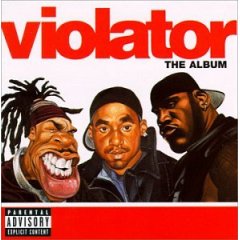
Violator: The Album is the first installment in the Violator hip hop compilations series. It was released on August 10, 1999 through Violator/Def Jam Recordings. It was the first release through the imprint Violator Records, a spin-off of Mona Scott & Chris Lighty's Violator Management company. A number of then-Violator Management clients and associates appear on the album, among them Q-Tip, Busta Rhymes, and Noreaga.
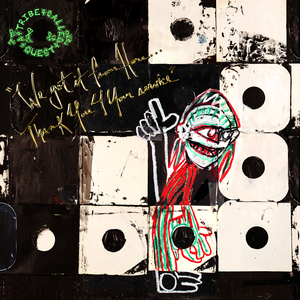
We Got It from Here... Thank You 4 Your Service is the sixth and final studio album by American hip hop group A Tribe Called Quest. It was released on November 11, 2016, by Epic Records.
The following is a discography of production by Q-Tip, an American hip hop musician, record producer, and DJ. All songs credited as "produced by A Tribe Called Quest" were produced by Q-Tip, with the exception of "True Fuschnick", "Heavenly Father", and "La Schmoove" by Fu-Schnickens, which were produced by Ali Shaheed Muhammad. Q-Tip's contributions as a member of The Ummah production team are also listed. Q-Tip has also been credited under the pseudonyms "The Abstract", "The Lone Ranger", and "Qualiall".
